VoxUkraine is an independent analytical platform founded in 2014, after the Revolution of Dignity, by a team of highly experienced economists and lawyers based in Ukraine and abroad. Our mission is to improve the level of the economic debate in Ukraine. We believe this will improve the quality of economic decisions in Ukraine and will contribute to the welfare of millions of our fellow Ukrainians.

294
articles published

4
new projects launched by VoxUkraine team

9
new people joined VoxUkraine team

1871
references to VoxUkraine studies and articles in Ukrainian media

1,2M
people covered by VoxUkraine content

714 000
UAH raised from individuals

Boris Davidenko, Editor-in-Chief
Hi! It’s awesome that you are interested in what we do here at VoxUkraine. Read on, and you’ll find more details about our work: what we did, when we did it, why we did it, and how much did it cost. (If you are short on time, please watch this 90-seconds video, which pretty much explains everything.)
Competition
We love competition in our work. It makes us faster, stronger, and more creative. And we eagerly support competition in economics. Competition makes companies reduce their prices, it drives consumer demand. To satisfy this demand, the companies invest in their production and technologies, they hire more employees. Competition is the mother of efficiency. And all these changes are reflected in the growth of GDP and population welfare.
If you don’t trust economic theory, look at the positive changes that happened to Ukrainian taxi service Uklon after Uber, the world’s largest taxi company, entered Ukrainian market. Competition, and nothing but fair market competition can help Ukrainian companies become global power players.
Level playing field
“All animals are equal, but some animals are more equal than others”. It looks like in modern Ukraine people forgot where this false commandment had led the protagonists of the Animal Farm by George Orwell. Here’s a quick reminder: it led them to a moral breakdown and creation of a totalitarian “state”. Ukrainian markets are full of exceptions, special conditions, and preferences; they are characterised by limited and complicated access, unequal taxing, and selective application of justice. All this distorts the markets, makes them inefficient, impairs competition, and results in slowing down the economy and depriving most Ukrainians of the chance to prosper. We follow the principle of the “level playing field” in our own lives, too. For example, the process of peer review is obligatory to all our writers — from student to Nobel laureates.
Sustainable and inclusive growth
Over the past 40 years, rich economies (GDP per capita over $ 20,000) grew by an average of 3.85% per year, while some of the poorest economies (GDP per capita less than $ 2000) grew by 3.91%. Complete nonsense? No, it isn’t. The thing is that rich countries fell less frequently and recovered more quickly. That’s why we support structural reforms and creation of institutions able to ensure a sustainable growth, and we are skeptical of the miraculous recipes to boost the economy before elections.
Merit-based approach
There’s a word and a phenomenon in Ukraine that is not quite familiar to foreigners — nepotism. And, unfortunately, it’s difficult to translate into Ukrainian the expression “merit-based approach”. We also have a saying that goes, “Many talented people were born in Kyiv, but almost none of them died here”. This saying perfectly explains the situation; oftentimes, those who become successful are not the most qualified, but the most loyal; not the most talented, but the most convenient; relatives, friends, and countrymen of those in power steal the place of the smartest. Talented people are simply leaving for the countries where they won’t have to spend their time and energy on fighting against nepotism, “dear friends” of those in power, and Lady Justice who lifts her blindfold when needed. The same goes for the economy; if the markets are distorted to the point they don’t reward those most creative and most efficient, but recompense those in a position of power and those engaged in illegal schemes, then real entrepreneurs would rather fulfill their full potential elsewhere.
Transparency
It’s good to be transparent, especially it Ukraine; transparency is a powerful weapon and a powerful protection tool. It’s very difficult to discredit a civil society organisation, a company, a political party, or a ministry, if the information about these institutions is open, if their work processes are transparent, and if they are good at communication.
There’s a couple of classic examples in Ukraine, like ProZorro public e-procurement system. National transparency correlates with the level of the country’s economic development and population welfare. Quoting an IMF study, “Transparency and accountability are critical for the efficient functioning of a modern economy and for fostering social well-being”. If you don’t trust the IMF, take a look at the countries that made it to the top of the Open Budget Index rankings— New Zealand, Sweden, and Norway.
Our annual report will help you decide for yourself how transparent VoxUkraine is. Enjoy the reading.

332 000
readers visited VoxUkraine website last year

92
central and local media partners of VoxUkraine

33 000
followers across all VoxUkraine social networks

67
new contributors wrote articles for VoxUkraine this past year

2nd
place in the “information power” ranking

9
conferences / discussions / workshops were organized this past year
VoxUkraine has been created as an open platform for a substantive debate and search of solutions to economic issues of Ukraine. We don’t hold discussions for the sake of it, our purpose is to develop sound economic solutions. To ensure high quality of the discussion we need a “solutions infrastructure” — professional and unbiased legislative and executive power, universities with teaching scholars, think tanks with analysts, expert round tables and debates, and cooperative media helping spread information to millions of people. Unfortunately, many links in this chain are missing in Ukraine. That’s why we have a lot of work to do.
What did we focus on this past year?
Captured state. We kicked off the year by focusing on an issue important to Ukraine — captured state and the influence of oligarchs. Six researchers from Ukraine and abroad havy fully examined this issue. We didn’t limit ourselves to articles. We went as far as organising a discussion of the book by Chrystia Freeland, Plutocrats: The Rise of the New Global Super-Rich and the Fall of Everyone Else. Aivaras Abromavičius, Ukraine’s ex-Minister of Economy and Trade, and Dmytro Yablonovsky, Senior Economist of center for Economic Strategy, took part in the discussion.
Calculating the GDP. In spring 2017, we started a discussion on the accuracy of calculations of the GDP in Ukraine. Our study showed an abnormally high difference (600 bln UAH) between the value added (essentially, GDP) calculated using different methods. The study sparked a vivid discussion among experts — we received about 10 comments and articles. We also held an offline discussion featuring senior officers of the State Statistics Service of Ukraine. They heard our arguments and initiated an unscheduled examination of the methods of calculating the GDP, and found a mistake in one of the methods. Unfortunately, the right method showed the lowest GDP.

Ukrainian labor market. Last summer, we paid our attention to the labour market in Ukraine. This sphere requires a thorough and in-depth study. Currently there’s no unbiased data on the size of the salaries or the number of employees. We shed some light on this. We researched the “costs” of different skills at the labour market, and found out how rapid increase of the minimum wage influenced this market.
Inflation. Inflation didn’t escape our attention, too. The rise in prices was 1,5 times higher than the NBU target. VoxUkraine researched the reasons behind this, as well as peculiarities of Ukrainian pricing policy. For instance, we found out which segments of Ukrainian population experienced faster price growth.

Facebook impact. Last month, we launched a new project (product) — ranking of the impact of Ukrainian politicians on Facebook. What politicians’ use of social media has to do with the economic discussion promoted by VoxUkraine? It turns out, it has a direct impact; politicians, whether we like it or not, make part of this discussion. In Ukraine, Facebook is quite a powerful tool; almost all Ukrainian politicians take an active part in communication and advertising campaigns on Facebook. They invest quite a lot of money into growing their audience, creating content, and communicating with their followers. Our partners from Artellence helped us find out who is the most efficient on social media. Moreover, Facebook has become a battlefield for the hearts and thoughts of Ukrainians, and this fight involves using not only acceptable methods, but also armies of bots. we were the first to determine how many bots are there on the Facebook page of Petro Poroshenko.
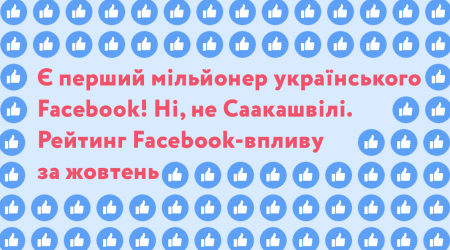
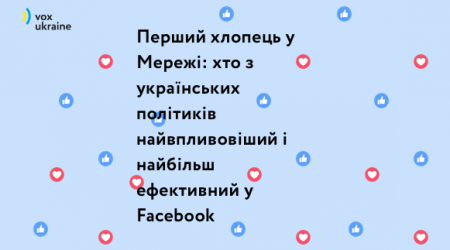
Big talk. “Ukraine 139” is another project launched by VoxUkraine in 2017. Ukraine was ranked 139th in the ranking of countries by GDP per capita (PPP). We asked the best economists from Ukraine and abroad why our country had ranked so poorly, and how Ukraine can make it to the top of the list.

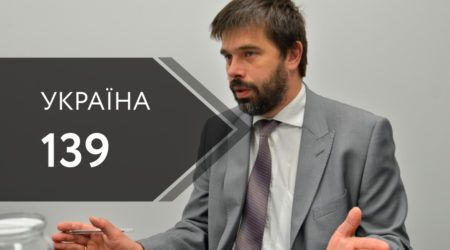
Of course, the list of the topics we discussed in 2017 goes on and on. The first one that comes to mind is the huge debate around the healthcare reform, sea port tariffs, monetary policy, and nationalization of PrivatBank, to name but a few.
We aim not only to discuss important issues, but to change the culture of economic decision making in Ukraine.
Quantitative indicators:
How people read us this past year

Where our readers come from
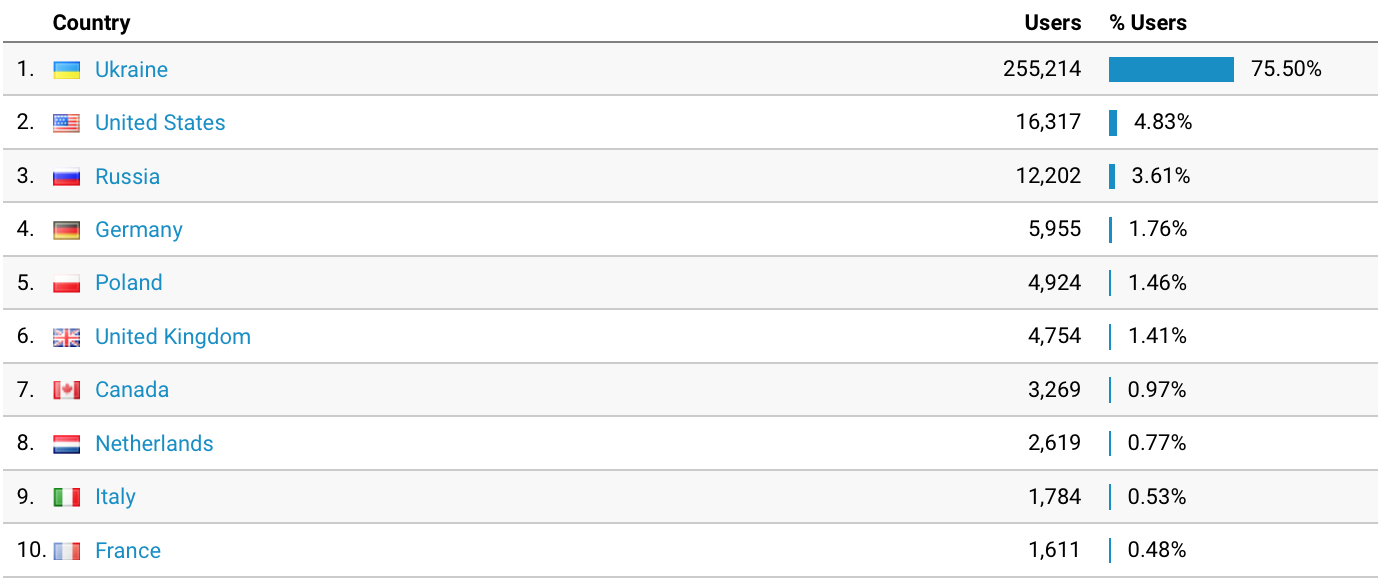
Who are our readers


Roger Myerson, 2007 Nobel Prize Winner in Economics: "To me VoxUkraine is a place to go to learn about problems and progress of reform in Ukraine. It's very nice to know that carefull debate is being represented to global audience and to people in this country."

1000 fact-checks

52 articles

24 fact-checking videos

~400 000 views

80 politicians and influential people checked

10 radio broadcasts
VoxCheck checks statements by Ukrainian politicians and debunks economic myths spread by them. In 2016, its first year of existence, we at VoxCheck have tried and tested our fact-checking methodology. In 2017, we focused on expanding the project; our team grew from 2 to 5 analysts, we started monitoring politicians on a weekly basis, we launched an internship program and a couple of new fact-checking projects.
Qualitative results:
1. We checked the statements by Ukraine’s top politicians:
We partnered with Novoye Vremya magazine to create the first-ever «Ranking of Populists and Liars in Ukrainian Politics» Over the period of two months, VoxCheck team has monitored and checked the statements by 20 influential Ukrainian politicians. From January 2018, we’ve been updating the ranking on a monthly basis.
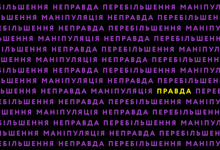
2. We taught Ukrainians the art of fact-checking and critical thinking
We’ve worked with interns and volunteers, plus, we held six fact-checking trainings.

Iryna
Shatokhina

Iryna
Kit

Olena
Diadikova

Mykhailo
Drapak

Stepan
Kovaliov

Maksym
Sytnyk

Maria
Bohdanovska

Olena
Kolomyitseva

Marta
Kobrynovych

Viktoria
Vyshnivska

Anastasiia
Russu

Sofia
Denysenko

Bohdan
Baluik

Illia
Koldomasov

Kseniia
Omelchenko

Andrii
Hryshchuk

Sofia
Kovalenko

Roman
Neyter

Petro
Bodnar

Yuliia
Zhaha
The most popular fact checks
This past year, we’ve checked the statements by different politicians and various topics — for example, the message from the President to the Parliament, the brochure by Batkivshchyna political party on the moratorium on the sale of agricultural land, or politicians’ quotes about the healthcare reform.
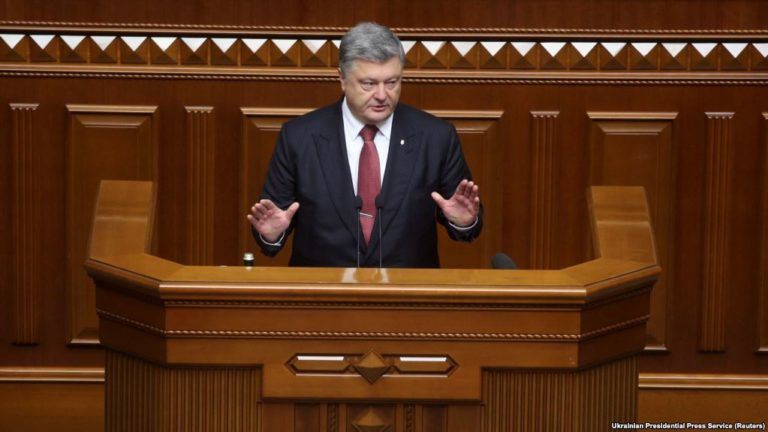
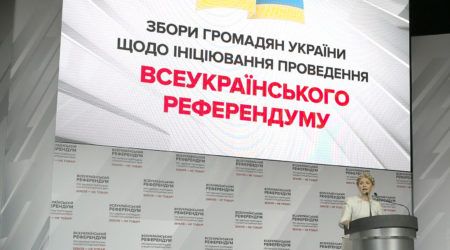
What people say about us:

Ulana Suprun, the Acting Health Minister of Ukraine: “The Ministry of Health of Ukraine warns you: lies and manipulations are detrimental to your health! Trust the reliable sources of information and take care of our common information space! Here’s a research by VoxCheck about the truth and populism in Ukrainian politics”..

Volodymyr Groysman, Prime Minister of Ukraine: “What we’ve actually seen is that many Ukrainian politicians talk through the back of their necks, and what they say often contradicts the reality. How unlucky Ukrainians are to have politicians that lie through their teeth.”

Vladyslav Rashkovan, Alternate Executive Director at International Monetary Fund: “Projects like #VoxCheck must filter such lies, and not only on our computer screens; they also should prevent dishonest people from getting into power.”

40
experts assess regulatory acts every two weeks

149
regulatory acts were analyzed and assessed

24
expert assessments and iMoRe publications
The main purpose of the project
To inform the society about the pace and depth of the country’s reform process. We assess Ukraine’s only index for monitoring reforms based on regular assessment provided by more than 40 experts who evaluate the impact of government decisions (changes in the regulatory environment) on the reforms.
Qualitative results
The iMoRe has long become a reliable source of unbiased and quantitative information (which makes this project unique). It has been referred to by Ukrainian and foreign think tanks, experts, civil society leaders and even the President in his annual address to the Parliament. In 2017, іМоRе presented Ukraine with several new projects; based on iMoRe database, VoxUkraine has built the Reforms Support Index — a tool to assess the MPs’ support of the reforms. We’ve also created a Guide of Reforms, which includes six major achievements and failures of the reform process since the Revolution of Dignity. The ministries ranking, also based on iMoRe, has revealed which ministries were the most efficient in initiating reforms.
Publications
According to the survey results we published 24 releases. Starting from the second quarter of 2017, we carried out and published updates on the reforms on a quarterly basis. iMoRe releases have been regularly published by the leading media, including KyivPost and Новое время.
Relevant events etc.
In January 2017, we analyzed how ministries had initiated the reforms, and we put up a ranking of reform initiators. The Ministry of Economic Development and Trade, the Ministry of Finance, and the Ministry of Justice made it to the top of the ranking.
In late 2017, we summed up the results of the reforms that had taken place in 2015-2017, and published a Guide of Reforms, where you can read about the major achievements and failures of the key reforms.

Mr Jocelyn Guitton, First Secretary of the Trade and Economic Section of the Delegation of the European Union to Ukraine: "We have been sharing the bi-weekly IMORE updates with our headquarter in Brussels, as well as with the EU Member States representations in Ukraine since the beginning, finding the IMORE reforms index a useful tool for measuring the speed of reforms in the five areas which are key for the country’s development (governance, public finance, monetary system, business environment, energy sector). The limited reforms index dynamic in the past year reinforces our message that Ukraine can and should do more reforms to develop faster and catch up with the growth rates of the European peers".

10
studies carried out in 2017

452
MPs were assessed within the project Efficiency of the MPs

39
global indices and indicators were analyzed
Ukrainians want the government and the parliament to be efficient and make decisions that reform and develop the country. However, there’s a challenging task — how do we assess the contribution of a ministry or a MP into the reform process?
Our DataVox project might be a partial solution to this problem. It studies political processes and activities of the Verkhovna Rada using open data and mathematical treatment.
Today, data-driven information is very relevant and important, because Ukrainian media are full of comments, news without facts, thoughts, value judgements etc. There’s a critical shortage of a thorough, verified, and accessible analysis. We believe that Ukrainians should have access to trustworthy and high-quality analytics. In 2017, we continued analysing political processes and decision-making models in Ukraine using unbiased digital data.
This past year, we’ve carried out 10 large research data-driven projects. Using machine learning algorithms, we explained and assessed the work of the Verkhovna Rada and the Cabinet of Ministers, analyzed the political processes and efficiency of the banking system.
The most popular special projects among our readers
Just in time for the 26th birthday of Ukraine we decided to take an unbiased look at the beginnings of modern Ukraine and compare the cold statistics describing the country in 1991 and 2017. The article triggered a strong reaction of our readers and was viewed nearly 50,000 times, not including reposts on other resources.
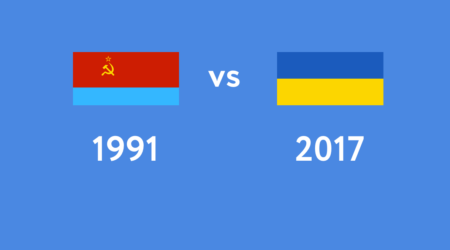
In 2017, we at VoxUkraine have continued to analyze the work of the Verkhovna Rada using cold statistics. In March, when the 5th session of Verkhovna Rada was over, we carried out an analysis of the MPs votes for reform draft laws. Forty iMoRe experts have chosen the regulatory acts that had been positive for the country.
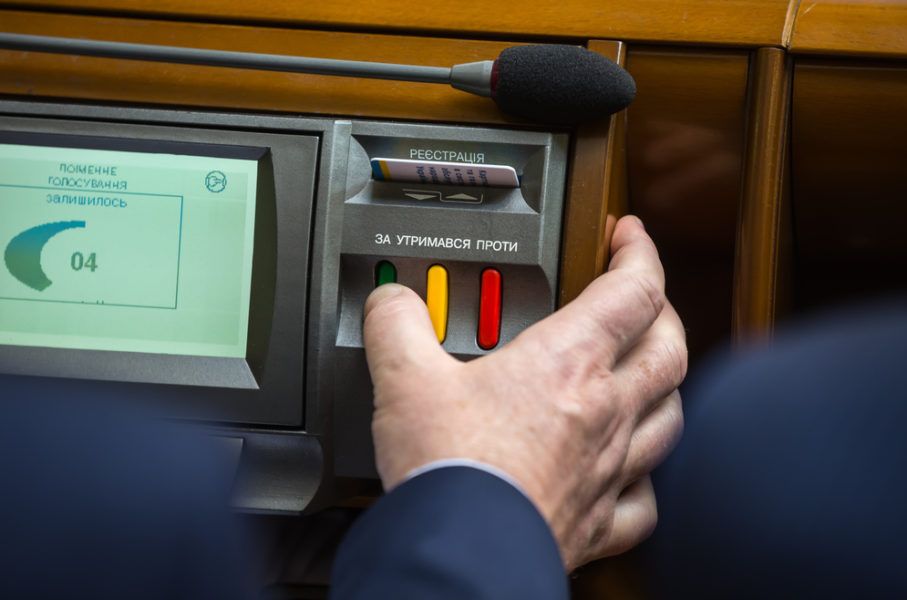
Where is Ukraine moving, and at which pace? Unbiased answers to these questions are critically important for the future of our country. There’s no a single index or ranking that would answer this question. However, 40 key international indices provide an unbiased statistics on successes and failures of Ukraine. For our readers’ convenience, we divided the rankings into different groups and visualised dynamics for the past six years.
Efficiency of the MPs
We love and respect statistics, and that’s why we always refer to it. Here’s a fun fact: 80% of Ukrainians don’t trust the members of parliament.
At every election, Ukrainians don’t make a good choice, and one of the reasons is the lack of clear criteria for assessing the work of MPs. Parliamentary elections are planned to be held in 2019. To help Ukrainians make a more informed choice, we’ve launched the project «Efficiency of the MPs». It is based on the Reform Support Index — an unbiased and convenient tool for assessing how deputies supported the reform laws. The Reform Support Index shows the maximum possible contribution of a MP to the adoption of progressive or anti-reform laws that were used in the iMoRe index during the 8th convocation of the Verkhovna Rada. These laws have been selected and assessed by more than 40 independent experts.
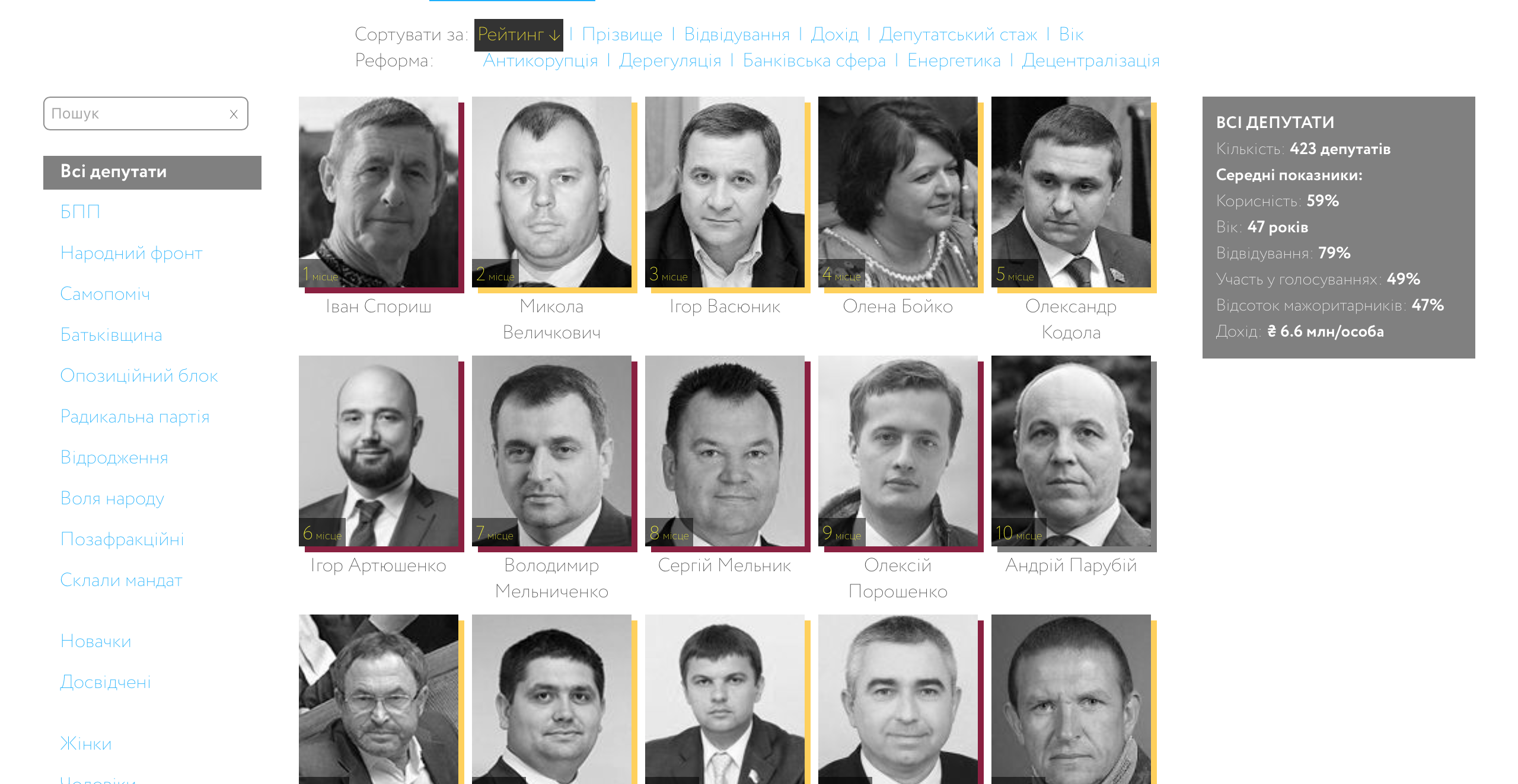
The page of the project Efficiency of the MPs, which contains a convenient database of Ukrainian MPs, has been visited by more than 1000 readers per month. In total, the Index has been viewed more than 11,000 times, it triggered an active discussion on social networks, in particular, a public reaction of at least 11 MPs. We shared the results of the project on two radio- and TV broadcasts.
The Efficiency of the MPs database will be updated during each parliamentary session before the elections. We carried out this project with the help of our readers — more than 120 people invested more than UAH 150,000 into this project.
Ministries’ ranking
In 2017, VoxUkraine continued to assess activities of the Ukrainian government. This past spring, a year has passed since Volodymyr Groysman was voted in as the Prime Minister of Ukraine and the new Ukrainian Cabinet of Ministers was formed. Which ministries were actively implementing reforms, and which simulated their activities?
The ministries didn’t have clear KPIs and criteria for assessing the work of the government. VoxUkraine experts, using a specially developed methodology, assessed the efficiency of various government departments. The ranking consists of four major components: assessment of the program of the Cabinet of Ministers of Ukraine for each ministry, assessment of the implementation of the Cabinet of Ministers program, expert assessment of the reform activities of the ministries, and the responses of the ministries to the VoxUkraine requests for information.
After one year of work of the Groysman government, the Ministry of Finance, the Ministry of Health, and the Ministry of Education and Science made it to the top of the ranking.
We would like to sincerely thank our devoted team of top experts and analysts who work pro bono on this project: Svitlana Rusakova (Dragon Capital, VoxUkraine), Yaryna Basystyuk (University of Pennsylvania, VoxUkraine), Oleh Ivanov (iMoRe expert), Dmytro Maznev, Larysa Hryhoryeva, Alina Zubkovych (The International Center for Policy Studies), Oleksandr Zholud (VoxUkraine editorial board member), Yaroslav Kudlatskyi (KSE), and Vadym Bizyaev (KSE).

1648
people enrolled for the course

545
people started the course

107
people received a certificate
(as of December 2017)
In 2017, VoxUkraine launched a project to develop high-quality economic journalism in Ukraine. We partnered with the Kyiv School of Economics to create the Center for Excellence in Economic Journalism, and developed a free online course «“How to write about the economy without errors”». EdEra online education platform, Oschadbank, and Energy Resources of Ukraine, provided financial support of the idea.
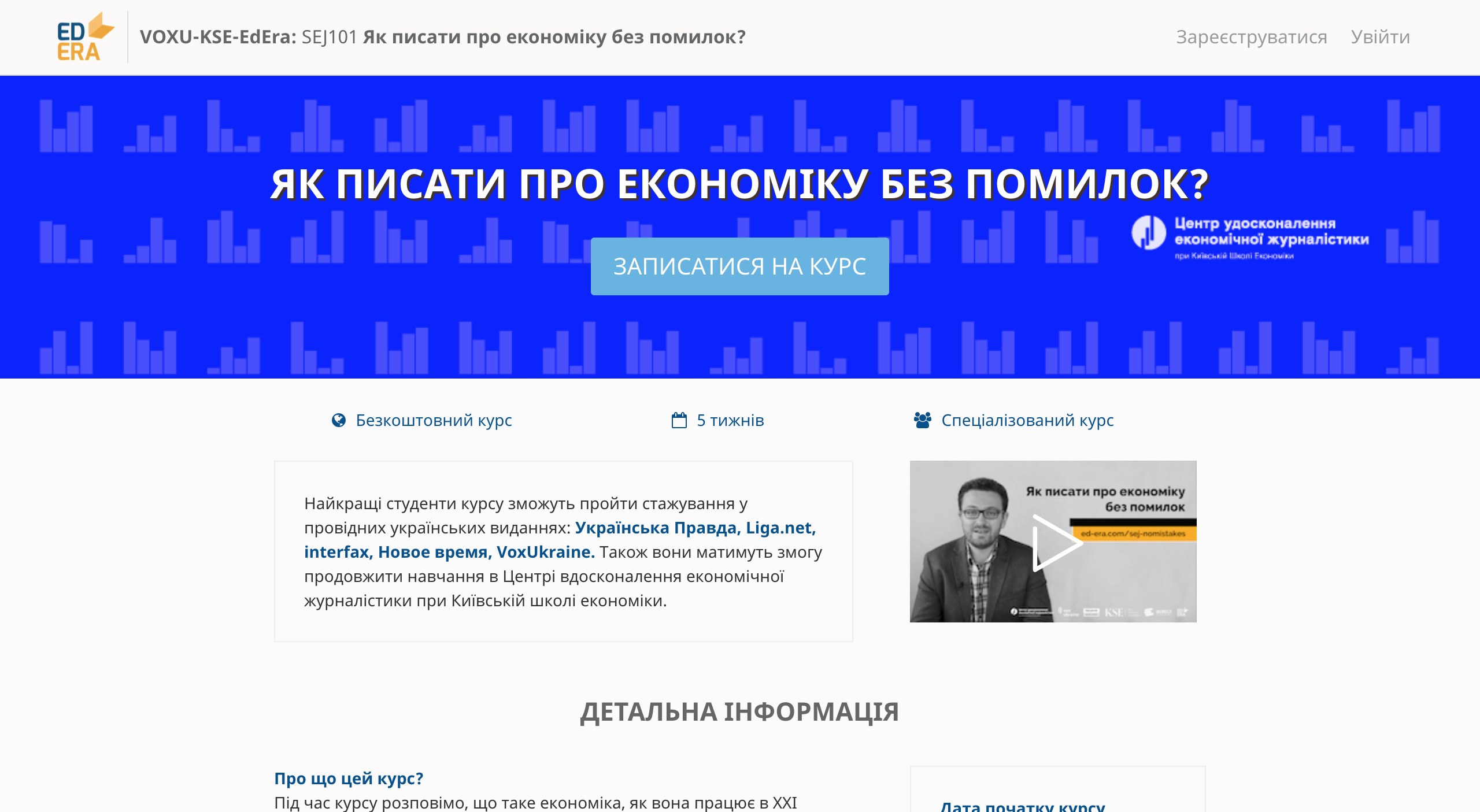
The official launch of the project took place on 11 October 2017. Every two weeks, we launched a new module, and in between the modules we discussed with the leading economic experts and journalists the topics of the module.
You can register for our open online course for free by following this link. All participants who have completed the course and passed the tests will automatically receive a certificate of completion.
Qualitative results
In partnership with KSE, we at VoxUkraine have established the Center for Excellence in Economic Journalism, and our online course has became a major component to training of future economic journalists. People who enrolled for the course came from all corners of Ukraine — from Lviv to Sloviansk. Moreover, students came also from Russia and Belarus.
The best ten students of the online course were awarded certificates and gifts at the first graduation ceremony of the Center for Excellence in Economic Journalism.
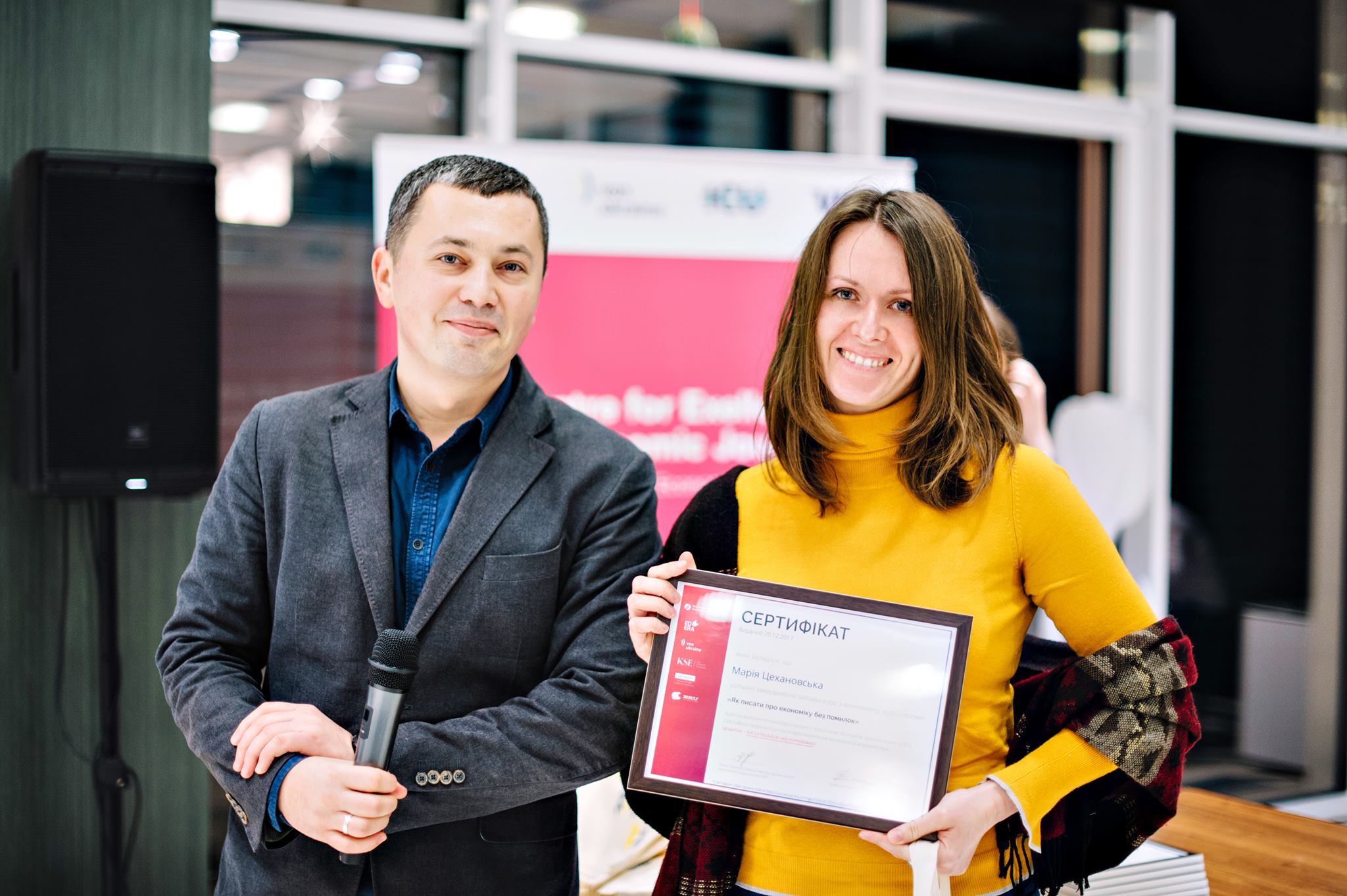
In February 2018, some of them got the opportunity for internship with the Economic Truth, Liga.net, Interfax, New Time, and VoxUkraine.
When promoting the course, we held seven public events, including three meetings of a discussion club created on the base of the Center for Excellence in Economic Journalism.

246
expert comments created and distributed in local media

1169
times local media published the content of the project

80
local media partners
This project was launched in early 2017. Its purpose is to provide the large audience of the local media with an access to an unbiased analysis about economy and the real course of the changes in the country. VoxConnector has also been building communication between regional media and the Kyiv expert community.
Qualitative results
The efforts of the project were aimed at: 1) raising awareness of the local media on the economic processes and reforms; 2) building relationship between the Kyiv expert community and the regional media.
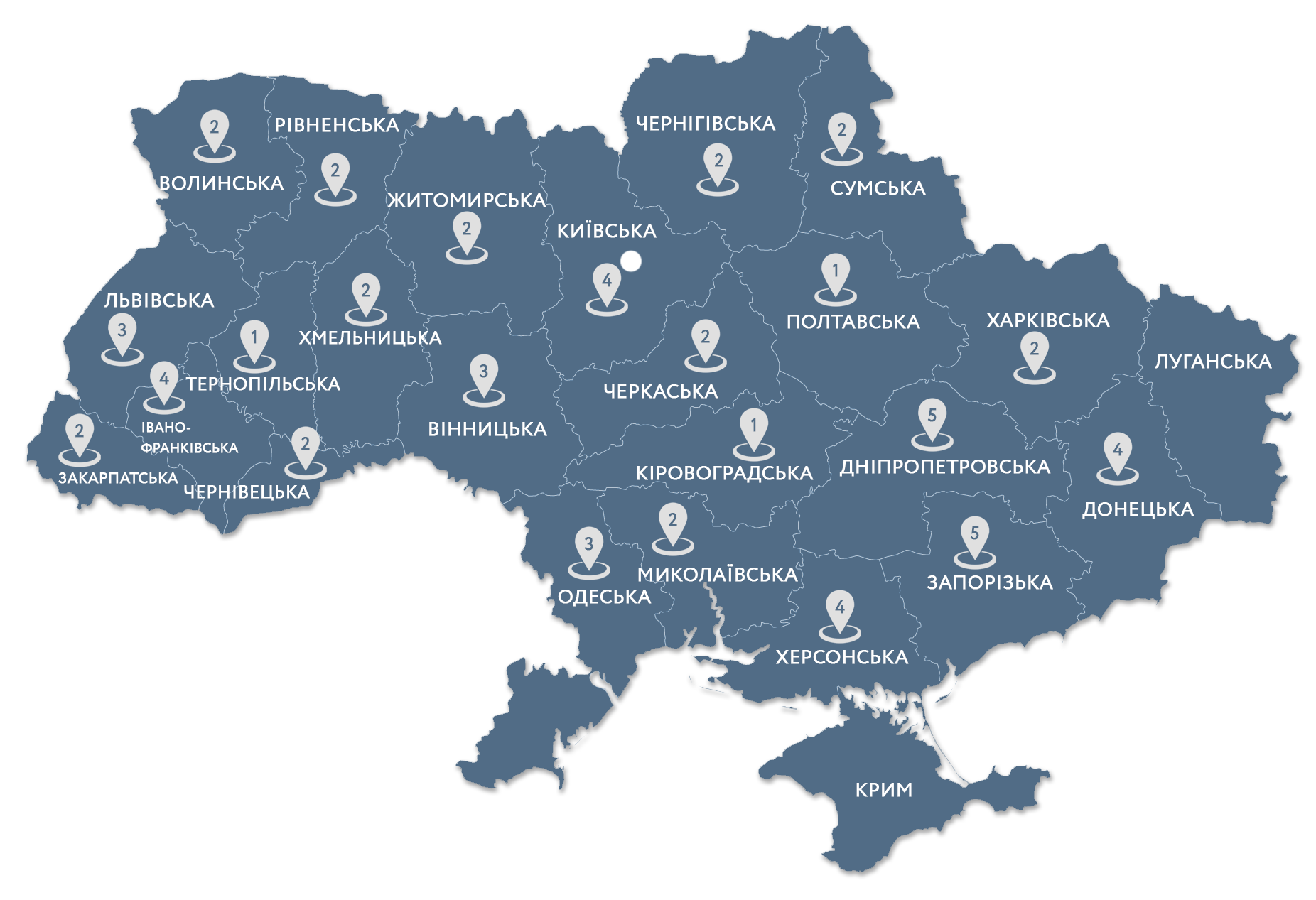
A major qualitative result is providing enough expert analysis to the local media space. Over the period of a year, analysts of the project published their comments 1169 times in the local print and online media. On average, 500 readers viewed one comment.
Video comments by VoxConnector were viewed 90,000 times.
Events
1. On 2 March 2017, we organized a major conference Transformation’17. What Will Reforms Change in the Life of Ukrainians.
The purpose of the conference was to bring together representatives of the regional media, professional experts, and representatives of the government to discuss the key changes that were to affect the daily lives of Ukrainians in 2017.
149 media and NGOs representatives took part in the event.
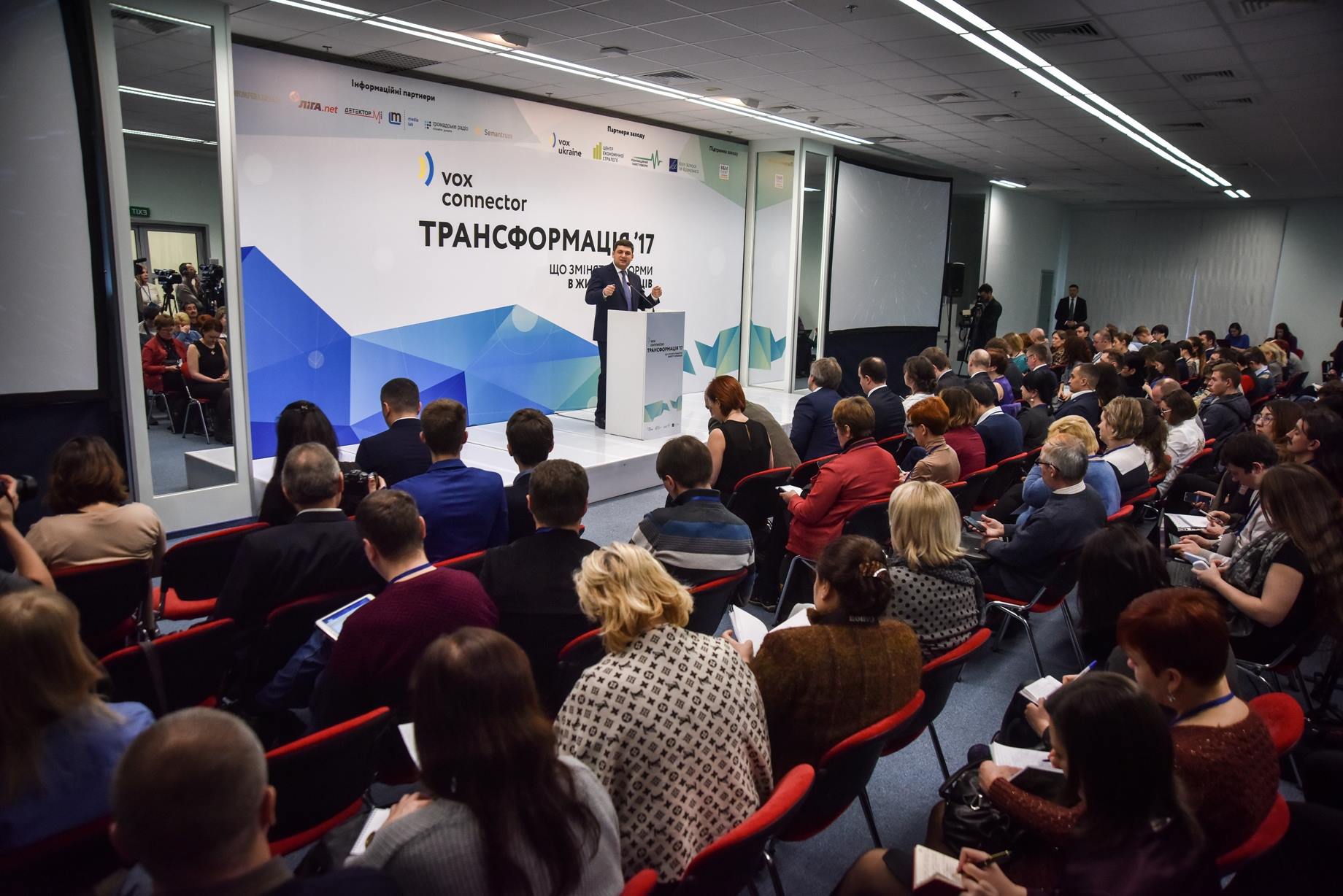

26 speakers of the conference included Volodymyr Groysman, Prime Minister of Ukraine; Marie Yovanovich, US Ambassador to Ukraine; Oleksandr Danyliuk, Minister of Finance of Ukraine; Ivan Mikloš, the co-chairperson of the Strategic Advisory Group for Supporting Ukrainian Reforms; Hennadii Zubko, Deputy Prime Minister of Ukraine, Minister of Regional Development, Building, and Housing of Ukraine; Yuriy Vitrenko, Director for Business Development at the National joint-stock company Naftogaz of Ukraine; Uliana Suprun, Acting Minister of Health of Ukraine; Ruslan Ryaboshapka, NAPC member; Tomas Fiala, CEO Dragon Capital; and other distinguished guests and reputable experts.
2) On 26 October 2017, we co-organized the conference What Can We Expect From the Autumn of Reforms.
The conference was initiated by the Center for Economic Strategy, and it was held thanks to the support of the Reforms Delivery Office of the Cabinet of Ministers, the Reanimation Package of Reforms, and VoxConnector. The purpose of the conference was to launch a wide discussion about the land, pension, education, healthcare, and privatization reforms.
More than 50 media representatives took part in the event.
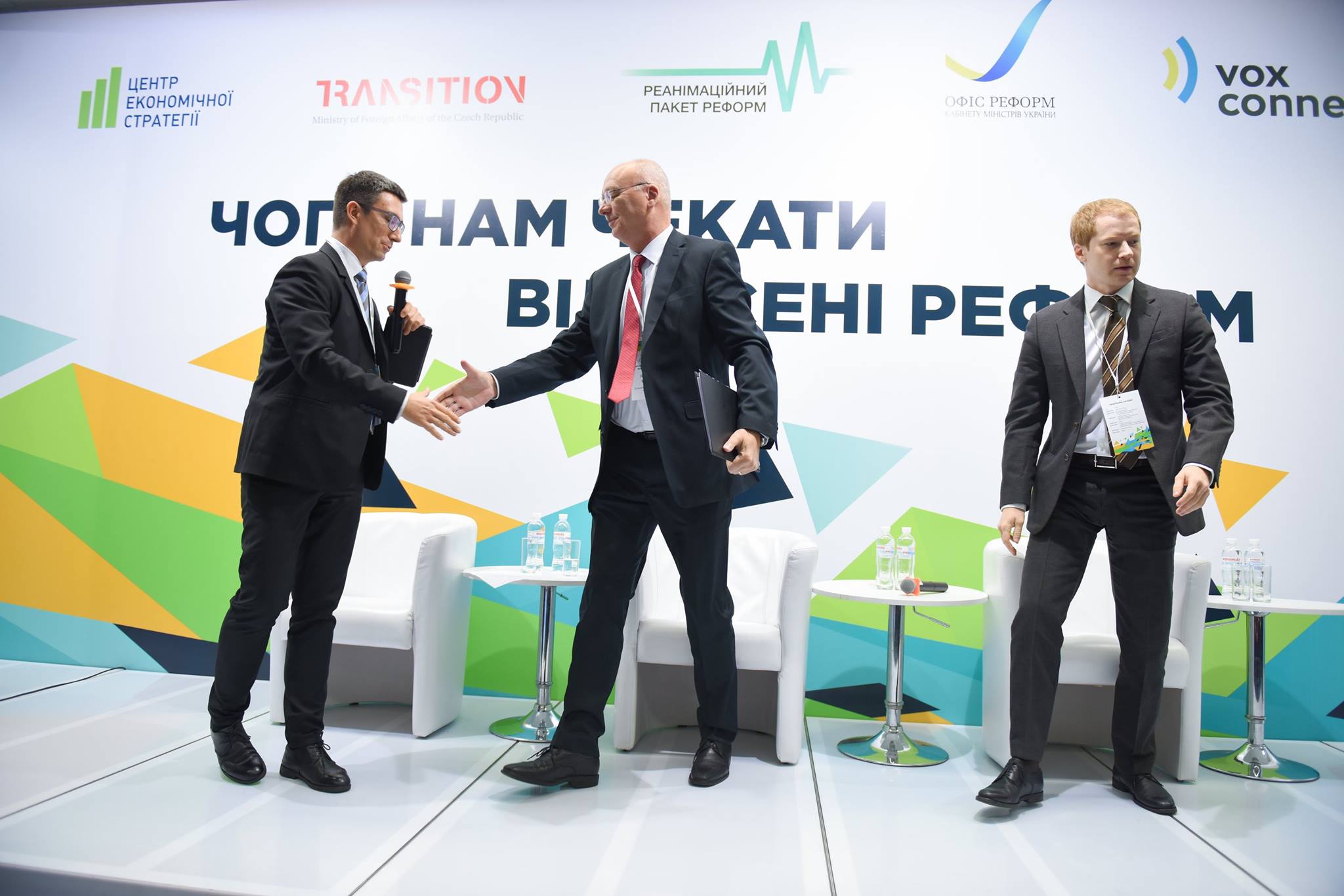
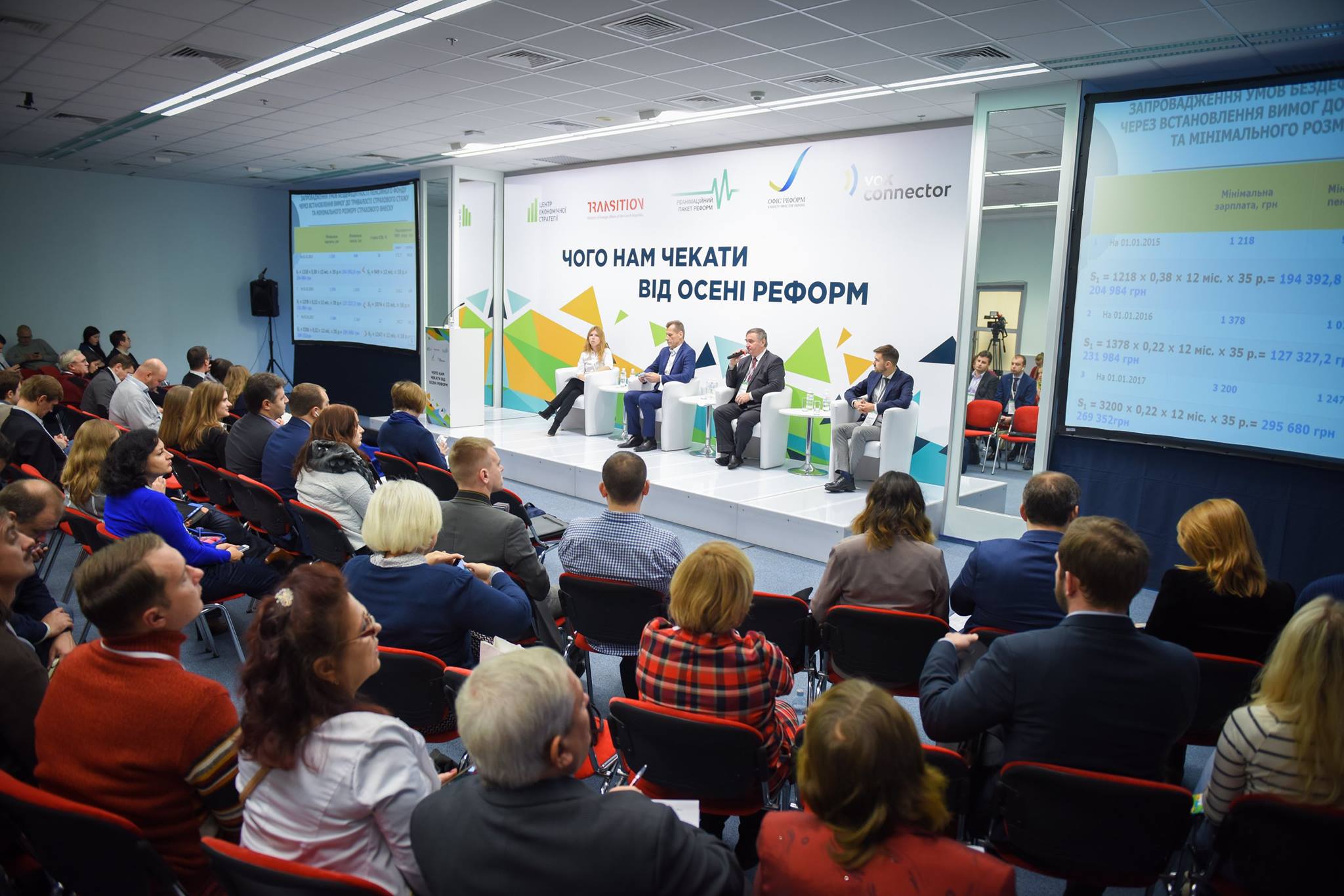
Elections 2019. We don’t like that reforms, budget, economic processes, and welfare of a large part of the population depend on the electoral cycle in the country. But this is the reality we live in. We want to maximize our social utility for the voters. We’ve already launched or are in the process of launching a number of “election” projects.
1. The first-ever ranking of liars and manipulators in Ukrainian politics.
We’ve been systematically monitoring every single public statement of the top 13 most influential Ukrainian politicians, we check the reliability of the facts provided by them, and we create a ranking. We believe that Ukrainian voters should have access to the information that explains manipulation of the participants of the election race. Ukrainska Pravda is our partner in this project.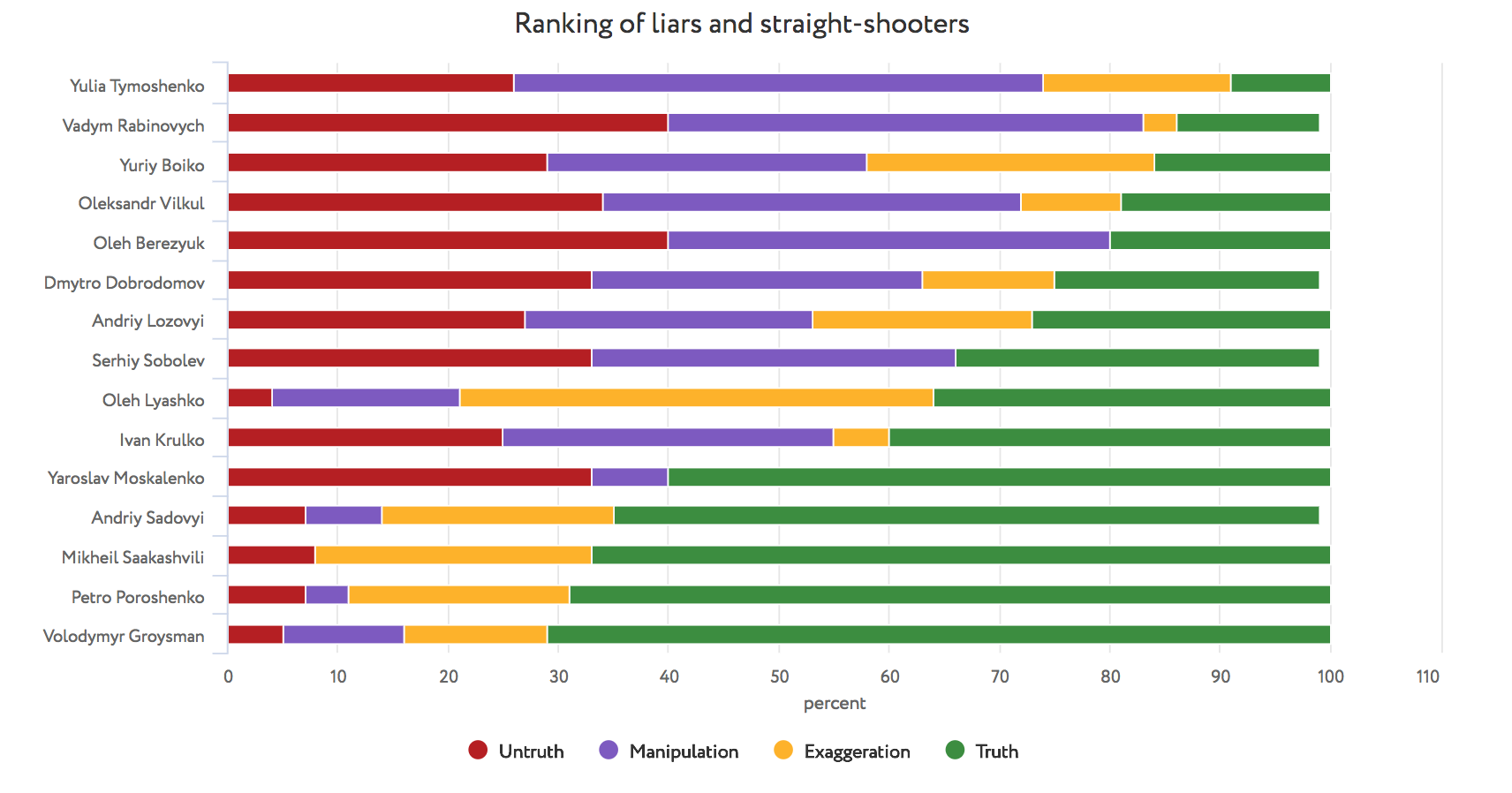
2. Efficiency of the MPs. We will continue assessing and reporting the work of each and every MP. That’s important.
3. Budget WatchDog. Ukrainian authorities have a sad tradition — to “tear apart” the state budget in the year prior to election, trying to appease the voters. It is detrimental to the economy.
4. iMoRe will assess to which extent the new regulatory acts are reformative and determine the biggest successes (or failures) in their implementation.
5. We’ll study even more closely the work and shortcomings of the parliament. Within our joint project with UNDP we’ll identify the weakest sides of the Ukrainian parliamentarism and offer a remedy.
Not by elections alone. We’ll continue developing our online education projects for journalists. We plan to create at least one more new course. VoxConnector is launching the Editors Club — a community of journalists and editors who will be provided access to practical education and the best experts. And, of course, to a wealth of top-quality analytics. In 2018, we plan to initiate and raise the bar of the discussion around at least six topical issues, including populism, migration, industrial politics, state ownership etc. If you want to be heard, you’re welcome to send your article to us via [email protected].
Transparency and openness are among our core principles. We’re ready to openly speak about the sources of our money — how we get it, who gives it to us, and how we spend it.
Below is the structure of our receipts and disbursements in 2017:
International agencies and funds:
Companies:
Friends of VoxUkraine (in 2017, more than 1000 people supported us financially):
| Tomas Fiala | Andriy Pyvovarsky | Andrei Favorov |
| Peter Chernyshov | Konstantin Stetsenko | Hlib Zagoriy |
| Vladyslav Rashkovan | David Brown | Andriy Kobolev |
| Hryhoriy Shverk | Kateryna Zagoriy | Yuriy Vitrenko |
| Maksym Ischenko | Aliona Osmolovska | Marian Fedoryshin |
| Yuriy Kuzmyn | Maksym Koliadenko | Volodymyr Lavrinenko |
| Andrii Sherepenko | Diana Zubko | T. Zolotogolovyi |
| Maksym Storchak | Olena Bilan | Ilona Sologub |
| Roman Yusypchuk | Ilya Filippov | Ruslan Bespalov |
| Oleksiy Karnov | Andrii Levin | Yaroslav Patenko |
| Yuriy Budenko | Maksym Osiyevskyi | Boris Davidenko |
| Igor Knopka | Andrii Geonya | Svitlana Rusakova |
| Andrii Klesov | Vasyl Kalimon | Oleg Cherevko |
| Maksym Osiyevskyi | Roman Lemko | Dmytro Pryimak |
| Yaryna Klyuchkovska | Ilya Ovdin | Iov Gora |
| Olga Yeromenko | Dmytro Bondar | Stepan Kulyna |
| Andrii Kovakin | Oleksiy Lytvyn | Kostiantyn Rybnikov |
| Yaroslav Yermilov | Leonid Voloshyn | Yuriy Lytvyn |
| Roman Kyslyi | Cezar Herma | Roman Novachenko |
| Vladyslav Goncharov | Igor Lifanov | Olena Velychko |
| Roman Ozymko | Dmytro Savochkin | Yuliia Stepanenko |
| Oleksiy Nikitiuk | Olga Bedenko | Leonid Tsodikov |
| Kyrylo Kozlov | Maksym Kotlyar | Petro Vizhevskyi |
| Oleksiy Oreshko | Pavlo Prystupa | Tetyana Sadovschykova |
| Yevhen Rozov | Yurko Salikov | Sergiy Podobryi |
| Anton Baklanov | Yaroslav Gul | Andrii Meakovskyi |
| Mykhailo Granchak | Olga Myrovych | Yuliia Mincheva |
| Ismet Bekirov | Stepan Nazaruk | Ibrahim Gabidullin |
| Olexa O’Bezik | Evgen Eliseev | Sergiy Kandul |
| Volodymyr Vorobey | Volodymyr Titar | Kateryna Cherepova |
| Angela Nikolayenko | M. Grekov | Oleksiy Volkov |
| Oleksiy Shklyaruk | Volodymyr Pylypchuk | Vadym Khokhlov |
| Sergey Khustii | Daryna Krasnolutska | Mykola Slyvka |
| Andrii Maliarov | Andrii Zhupanin | Oleksiy Kutsenko |
| Igor Bilous | Natalia Tanatarova | Volodymyr Klapan |
| Yuliia Stepanenko | Kateryna Ryzha | Roman Gavrylko |
| Oleksandr Chekotylo | Yaroslav Syvak | Victoria Strakhova |
| Igor Vorobiov | Mykola Hladilnikov | Vadym Karpiak |
| Dmytro Bilko | Philipp Kubrak | Oleksandr Yermilov |
| Natalia Zubrytska | Petro Pavlenko | Vlad Verchenko |
| Oleksiy Frolkin | Andrii Kosetskyi | Evgen Bova |
| I wanted to become an archaeologist | Anastasia Bondarenko | Sophia Chopan |
| Igor Samokhodskyi | Igor Stefurak | Andrii Utvenko |
| Oleksiy Kutsenko | Volodymyr Korniichuk | Volodymyr Nikitchuk |
| Oleksandr Tkachenko | Kateryna Tkachenko | Volodymyr Miroshnyk |
| Yevgenia Rudenka | Sergiy Vinderskikh | Igor Pashchenko |
| Yuliia Vasyliv | Anna Komarova | Oleksandr Mokliachuk |
| Natalia Shyrshova | Kateryna Filonova | Anton Protsenko |
These are the people that had done all that you have just read about:

Boris Davidenko
Editor-In-Chief, CEO

Roman Basalyga
COO

Volodymyr Kadygrob Strategic Communications Advisor

Anna Karplyuk Financial Director
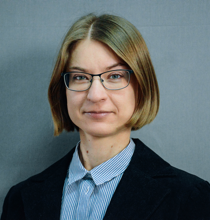
Olena Shkarpova
VoxCheck Editor
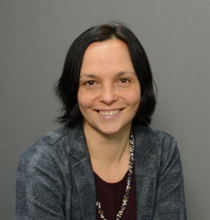
Tetyana Tyshchuk
iMoRe Editor

Oleksandr Nadelnyuk Junior Analyst

Maria Kriuchok
VoxEd Project Manager

Yulia Mincheva Communication Manager

Maksym Skubenko VoxCheck Analyst

Galyna Kalachova VoxConnector Editor

Vitaliy Protsenko Economist

Serhii Kazarian
Video Editor

Oleksii Krymeniuk Junior Analyst, VoxCheck
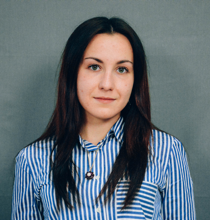
Svitlana Slipchenko Junior Analyst, VoxCheck

Yar Batoh
Junior Analyst, VoxCheck

Anastasia Chernukha Web-Site Editor

Kyrylo Iesin
VoxConnector Project Manager
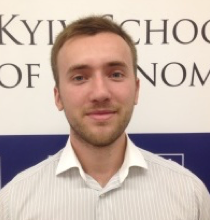
Dmytro Ostapchuk DataVox Editor

Ksenia Alekankina Communication Manager
Creation, development, and work of VoxUkraine would be impossible without members of the editorial board, who invest a huge amount of their time and effort to our project on a pro bono basis.

Olena Bilan
Dragon Capital

Volodymyr Bilotkach Newcastle University

Tom Coupé
University of Canterbury, New Zealand

Yuriy Gorodnichenko
UC Berkeley
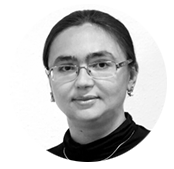
Veronika Movchan
IER

Tymofiy Mylovanov University of Pittsburgh

Denys Nizalov
KSE
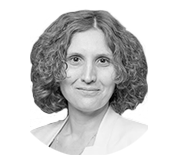
Olena Nizalova University of Kent

Nataliia Shapoval
KSE

Alex Nikolsko-Rzhevskyy
Lehigh University

Ilona Sologoub
KSE

Oleksandr Talavera
Swansea University

Oleksandr Zholud
NBU
All that you’ve read on the pages of this report had been made possible thanks to support and cooperation of our readers, contributors, editorial board, donors, volunteers, and the rest of the team. We’re sincerely grateful to all those who supported us, inspired us, and provided their constructive feedback. Our biggest achievement is the ever-growing VoxUkraine community. It’s our highest value, which motivates us to achieve more. Thank you for staying with us!